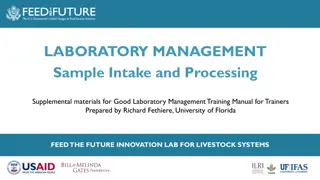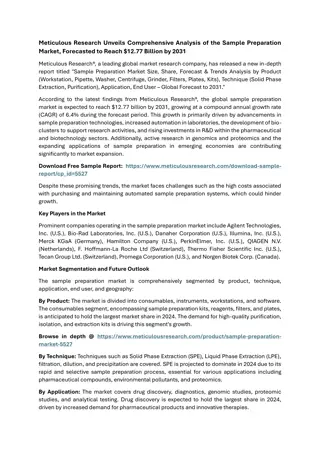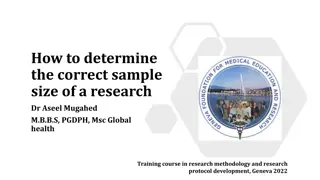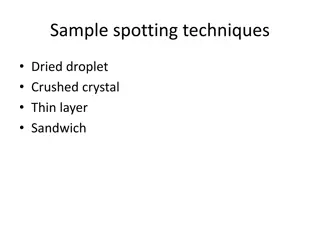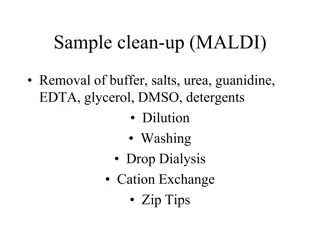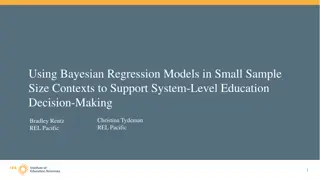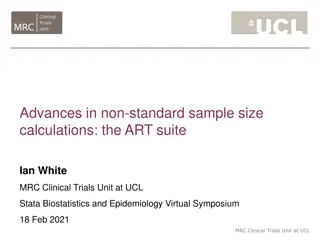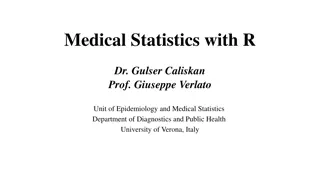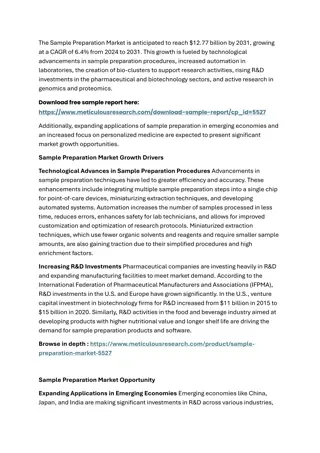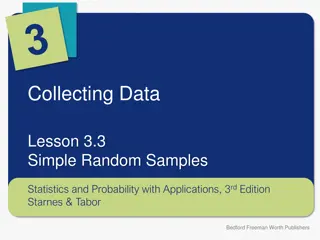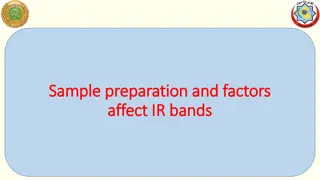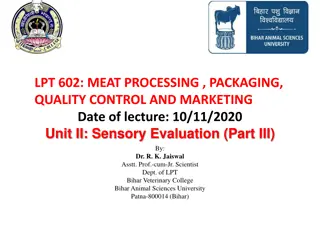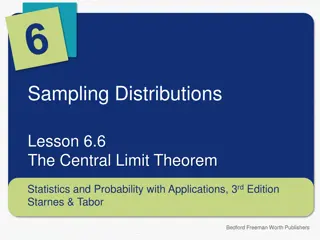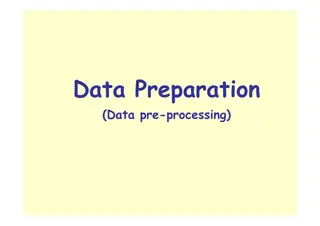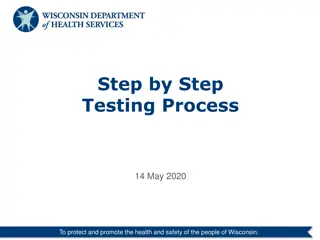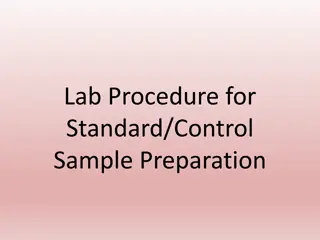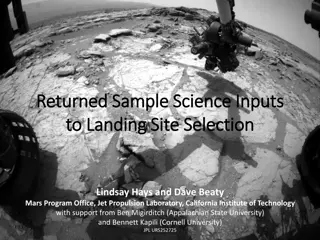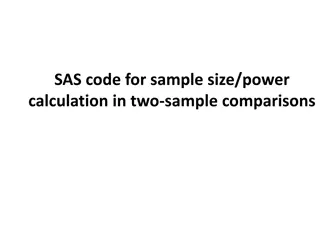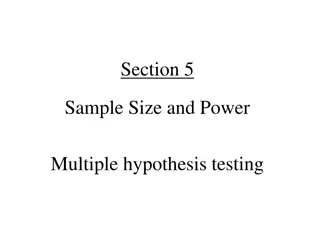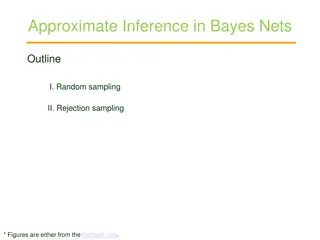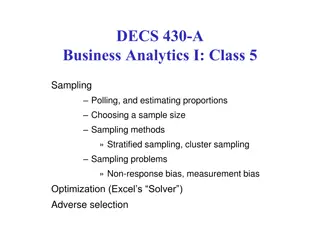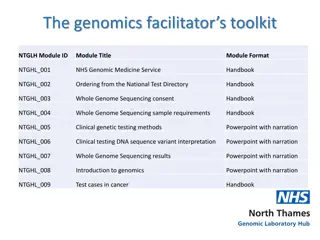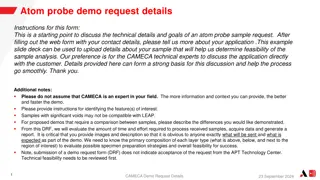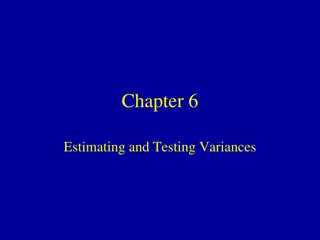NDA PREPARATION TIPS
NDA PREPARATION TIPS #nda #army #navy #trending #viralpost\n\n\nAre you looking for effective NDA preparation tips? Look no further! Welcome to Manasa Defence Academy, where we strive to provide the best preparation to NDA aspirants. In this video, we will share some valuable insights and strategies
2 views • 1 slides
Laboratory Sample Intake and Processing Procedures
Efficiently manage sample intake and processing in your laboratory with these supplemental materials. From submission checklists to sample preparation guidelines, ensure accurate analyses by following these organized procedures. Capture essential information through submission forms, labeling standa
11 views • 15 slides
Guidance for the training of cervical sample takers
Efficient and accurate cervical screening sample requests are crucial for timely and appropriate patient management. Utilizing the Open Exeter system, sample takers can access pre-populated forms to streamline the process. When deviating from Open Exeter, providing a valid explanation ensures contin
7 views • 13 slides
Rice Nursery Preparation and Transplanting of Rice
Learn about different methods of rice nursery preparation and transplanting techniques as explained by Dr. Triptesh Mondal, an Assistant Professor in the Department of Agronomy. The article covers dry nursery preparation, wet nursery setup, and Dapog nursery method with detailed instructions on seed
3 views • 11 slides
Meticulous Research Unveils Comprehensive Analysis of the Sample Preparation Market, Forecasted to Reach $12.77 Billion
Sample Preparation Market Size, Share, Forecast & Trends Analysis by Product (Workstation, Pipette, Washer, Centrifuge, Grinder, Filters, Plates, Kits) Technique (Solid Phase Extraction, Purification), Application, End User \u2013 Global Forecast to 2031\n
0 views • 2 slides
California Educator Preparation Programs: Highlights and Trends 2022-2023
The California Educator Preparation Programs Annual Report for 2022-2023 showcases key highlights and trends in the field. It includes insights on accreditation status, site visits, distribution of institutions, largest number of preparation programs, and members of the Committee on Accreditation (C
0 views • 20 slides
Determining Sample Size for Research Studies: Factors and Considerations
Sample size estimation in research is a crucial step that involves various factors such as effect size, population standard deviation, power of the experiment, and significance level. The effect size indicates the practical significance of research findings, with common measures like Cohen's d and P
1 views • 24 slides
Techniques for Sample Spotting in Mass Spectrometry
Learn about different sample spotting techniques including Dried Droplet, Crushed Crystal, Thin Layer, and Sandwich methods used in mass spectrometry analysis. Each technique involves specific steps for preparing and applying samples on a sample plate before analysis. Ideal sample concentrations for
10 views • 6 slides
Protein Sample Clean-Up Methods for MALDI Analysis
Protein sample clean-up for MALDI involves removing various contaminants like buffer, salts, urea, guanidine, EDTA, glycerol, DMSO, and detergents through methods such as dilution, washing, drop dialysis, cation exchange, and solid phase extraction using Zip tips. The process aims to reduce interfer
0 views • 8 slides
Utilizing Bayesian Regression Models for Small Sample Education Decision-Making
Bayesian regression models can be valuable tools for addressing the challenges of small sample sizes in educational research, particularly in the Pacific Region where data availability is limited. These models offer advantages for conducting robust analyses and informing system-level education decis
2 views • 25 slides
Advances in Sample Size Calculations for Clinical Trials: The ART Suite
This presentation discusses the importance of sample size calculations in research studies, especially in the context of clinical trials. It covers tools like ART and Power in Stata for binary and categorical outcomes, emphasizing the need to determine the right sample size to ensure research questi
3 views • 35 slides
Understanding Sample Size and Effect Size in Medical Statistics
Explore the crucial aspects of power analysis, sample size determination, effect size estimation, and their interrelations in medical statistics. Learn how these components influence experimental design and decision-making in research studies. Discover the significance of adequately balancing sample
0 views • 46 slides
Sample Preparation Market 2
The growth of this market is driven by technological advances in sample preparation procedures, increasing process automation in laboratories, the development of bio-clusters for supporting research activities, increasing R&D investments in the pharm
1 views • 3 slides
Back Titration in Analytical Chemistry
Back titration is a technique used in analytical chemistry to determine the concentration of an analyte by reacting it with an excess of another reagent first, followed by titration of the excess reactant. This method is especially useful in cases where direct titration endpoints are difficult to di
2 views • 14 slides
Understanding the Applications and Design of Analytical Ultracentrifugation
Analytical ultracentrifugation, a powerful technique in biochemistry, allows for precise measurement of sample properties and characterization of macromolecular complexes. The method is widely used for determining sample purity, equilibrium constants, and assembly mechanisms of biological complexes.
1 views • 17 slides
Sample Preparation Market 2
Automation in sample preparation results in an increase in the number of samples to be processed within less time, fewer errors due to automated workflow, increased safety for lab technicians, and improved customization and optimization for research
1 views • 3 slides
Understanding Simple Random Samples in Statistics
In this lesson, you will learn how to obtain a simple random sample using slips of paper or technology, understand sampling variability and the impact of sample size, and use simulations to test claims about population proportions. The concept of Simple Random Sample (SRS) is explained, where every
0 views • 18 slides
Understanding Factors Affecting IR Bands in Sample Preparation
Learn about the importance of sample preparation in infrared spectroscopy, including techniques for solid sample preparation and the choice of solvents to obtain accurate IR spectra. Discover how factors like inductive and resonance effects influence IR frequencies in different functional groups.
1 views • 14 slides
Cytology Sample Taker Trainee Mentorship Program Overview
This detailed guide outlines the mentorship program for cytology sample taker trainees, including mentor responsibilities, training sequence, interim assessment process, and key changes in mentorship roles. Trainees attend courses, observe smears under supervision, and progress to unsupervised sampl
0 views • 12 slides
Comprehensive Guide to Mouth Preparation for Dental Procedures
Mouth preparation is essential for ensuring the success of various dental procedures. It involves categories such as oral surgical preparation, periodontal preparation, and abutment tooth preparation. The main objectives are to restore oral health and eliminate any conditions hindering the success o
5 views • 19 slides
Water Sample Preservation, Transportation, and Storage Guidelines
Understanding the importance of timely analysis, this guide discusses factors affecting sample stability, recommended chemical preservatives for water samples, suitable containers for storage, and methods to minimize changes during transportation. It also highlights parameters to measure at the samp
0 views • 11 slides
Understanding Grow-Out Test for Genetic Purity Evaluation in Seed Certification
The Grow-Out Test is a crucial measure in seed certification to determine the genetic purity of seed lots. It helps in controlling genetic contaminations and ensuring compliance with prescribed standards. This test is essential for certain species like cotton, castor, musk melon, and brinjal in Indi
0 views • 16 slides
Sensory Evaluation in Meat Processing: Panelist Selection, Training, and Sample Preparation
The lecture covers the sensory evaluation process in meat processing, focusing on the selection and training of panelists based on criteria like willingness, capability, and general health. Panelists are categorized as trained or semi-trained, with detailed guidelines for preparing and presenting me
0 views • 8 slides
Understanding the Central Limit Theorem in Statistics
This lesson covers the Central Limit Theorem, which states that the sampling distribution of a sample mean becomes approximately normal as the sample size increases, regardless of the population distribution. It explains how the distribution of sample means changes shape and approaches a normal dist
0 views • 7 slides
Importance of Data Preparation in Data Mining
Data preparation, also known as data pre-processing, is a crucial step in the data mining process. It involves transforming raw data into a clean, structured format that is optimal for analysis. Proper data preparation ensures that the data is accurate, complete, and free of errors, allowing mining
1 views • 37 slides
COVID-19 Testing Process in Wisconsin
The COVID-19 testing process in Wisconsin involves outreach, supplies distribution, patient care, and sample collection. Exact Sciences account managers facilitate testing outreach to SNFs, provide supplies, and ensure proper sample collection procedures. The process includes online ordering of supp
1 views • 8 slides
Lab Procedure for Standard/Control Sample Preparation
Here is a detailed lab procedure for standard/control sample preparation, including preheating the hot plate, labeling petri dishes, preparing the mixture, adding phosphorescent powder, heating the mixture, and stirring continuously. Images are provided for each step to assist in the process.
1 views • 15 slides
Discovering a New Choice in ICP-MS Low Volume Handling: MVX-7100 Workstation Automation
Explore the MVX-7100 workstation for ICP-MS low-volume handling, offering features like reduced reagent usage, well plate compatibility, sample mixing, and more. Addressing challenges of working with small sample sizes at trace levels, this system provides automation options and is supported by rese
0 views • 33 slides
Insights into Mars Sample Return Science Inputs for Landing Site Selection
The Mars Program Office at Jet Propulsion Laboratory has conducted a systematic survey to determine landing site priorities for sample return missions. Insights from the astrobiology and cosmochemistry/petrology communities reveal key interests such as geologic age, rock-water interactions, and dive
0 views • 16 slides
Water Licence Surveillance Network Program (SNP) Guidelines
Water Licence Surveillance Network Program (SNP) provides detailed instructions on safety measures, sample collection preparation, sample locations, and analysis procedures. It emphasizes the importance of wearing gloves, getting vaccinations, using hand sanitizer, and proper field gear during sampl
0 views • 13 slides
SAS Code for Sample Size and Power Calculation in Two-Sample Comparisons
SAS code snippets are provided for conducting power and sample size analyses in two-sample comparisons using the TWOSAMPLEMEANS statement. The code covers scenarios such as two-sample t-tests assuming equal variances, unbalanced designs, unequal variances, and more. Examples and syntax are included
0 views • 10 slides
Understanding Sample Size, Power, and Hypothesis Testing in Statistics
Sample size determination based on estimation precision and confidence interval width is crucial in statistical analysis. By calculating the necessary sample size, researchers can ensure sufficient standard errors and confidence intervals. Additionally, the relationship between power and sample size
0 views • 50 slides
Approximate Inference in Bayes Nets: Random vs. Rejection Sampling
Approximate inference methods in Bayes nets, such as random and rejection sampling, utilize Monte Carlo algorithms for stochastic sampling to estimate complex probabilities. Random sampling involves sampling in topological order, while rejection sampling generates samples from hard-to-sample distrib
0 views • 9 slides
Understanding Sampling Methods in Business Analytics
Sampling plays a crucial role in estimating proportions and making informed decisions in business analytics. From polling to estimating proportions, this class explores sampling techniques, sample size determination, and potential biases. Learn about choosing a sample size, stratified and cluster sa
2 views • 23 slides
Overview of Immunohistochemistry (IHC) in Diagnostic and Research Laboratories
Immunohistochemistry (IHC) is a technique used to detect antigens in tissue sections by utilizing antibodies that bind specifically to target antigens. This method has evolved since the 1930s and plays a vital role in disease diagnosis, drug development, and biological research. IHC combines anatomi
0 views • 19 slides
Genomics Facilitator's Toolkit Summary & Sample Requirements
This toolkit provides essential resources for healthcare professionals involved in genomics services, covering topics such as genomic medicine, whole genome sequencing, clinical genetic testing methods, interpretation of DNA variants, and more. It also details the specific sample requirements for di
0 views • 24 slides
Atom Probe Sample Request Details and Instructions
This detailed guide provides instructions and recommendations for submitting a sample request for atom probe analysis. It includes information on how to describe the sample, provide images, and outline the goals of the analysis. By following these guidelines, customers can facilitate discussions wit
0 views • 5 slides
Diabetes Collaborative Project 2015-2016 Summary
In the Diabetes Collaborative Project 2015-2016, a random sample of 75 diabetic patients' records were queried monthly at each clinic site, with a total sample size of 450 patients reviewed monthly. Outreach activities were conducted based on sample data results. Metric goal variations were observed
0 views • 7 slides
Understanding Parameters, Statistics, and Statistical Estimation in Statistics
In statistics, we differentiate between parameters and statistics, where parameters describe populations and statistics describe samples. Statistical estimation involves drawing conclusions about populations based on sample data. The Law of Large Numbers explains the relationship between sample stat
0 views • 12 slides
Understanding Estimating and Testing Variances in Statistical Analysis
Estimating and testing variances is crucial in statistical analysis. Population and sample variances are key measures of squared deviations around the mean. Sampling distribution of sample variances, specifically for normal data, follows a Chi-Square distribution. Understanding Chi-Square distributi
0 views • 31 slides

